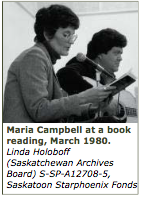
Maria Campbell is a community worker, storyteller, and filmmaker whose best-selling autobiography Halfbreed —an important document on racial relations in Canada—encouraged many First Nation people to become writers. Of Cree, French, and Scottish descent, she was born on April 26, 1940, eighty miles northwest of Prince Albert, in Park Valley, an impoverished Road Allowance community. The oldest of eight, Campbell quit school at age 12, after her mother died, to help her father, a Métis trapper, raise the children. At 15 she married a White man, largely in an attempt to keep the family together; but he became abusive, reported her to the authorities, and the children were placed in foster homes. After she moved to Vancouver with her husband he deserted her, and she entered a life of alcohol, drugs, and prostitution. She attempted suicide twice, suffered a nervous breakdown and was then hospitalized, at which time she joined the Alcoholics Anonymous program. To keep from drifting back to the street, she began writing Halfbreed (1973), which recounts the first thirty-three years of her life.
Campbell’s other publications include: People of the Buffalo: How the Plains Indians Lived (1976); Little Badger and the Fire Spirit (1977); Riel’s People (1978); Achimoona (an anthology, 1985); The Book of Jessica: A Theatrical Transformation (1989), co-authored with Linda Griffiths; and The Road Allowance People (1995). She has also written or directed stage plays, films, and videos. Campbell has been guest speaker at numerous conferences and universities across Canada, the United States and Australia on issues related to justice, women and youth in crisis, and community development. She has also been a visiting professor and writer-in-residence at various Canadian institutions. She holds honorary doctorates from Athabasca University, York University, and the University of Regina. Currently an associate professor at the University of Saskatchewan, she helps operate the Gabriel Crossings Foundation, a First Nation arts school committed to preserving traditional culture and arts; she also works with women in prison at the Pine Grove institute and with the Saskatchewan Native Theatre Company in Saskatoon. Her most recent work has been concerned with how people retain their identity when they have lost their homeland; for Campbell, identity is shaped by the land, and from that shape come narrative and song. If there is a theme that runs through her life and work, it is that inner peace and social justice can only be found by returning to the kind of spirituality—practiced by the early people of the plains—that regards humans and animals as interdependent, and that encourages people to listen to the guiding voices of the Grandmothers and Grandfathers.
Bernard Selinger

